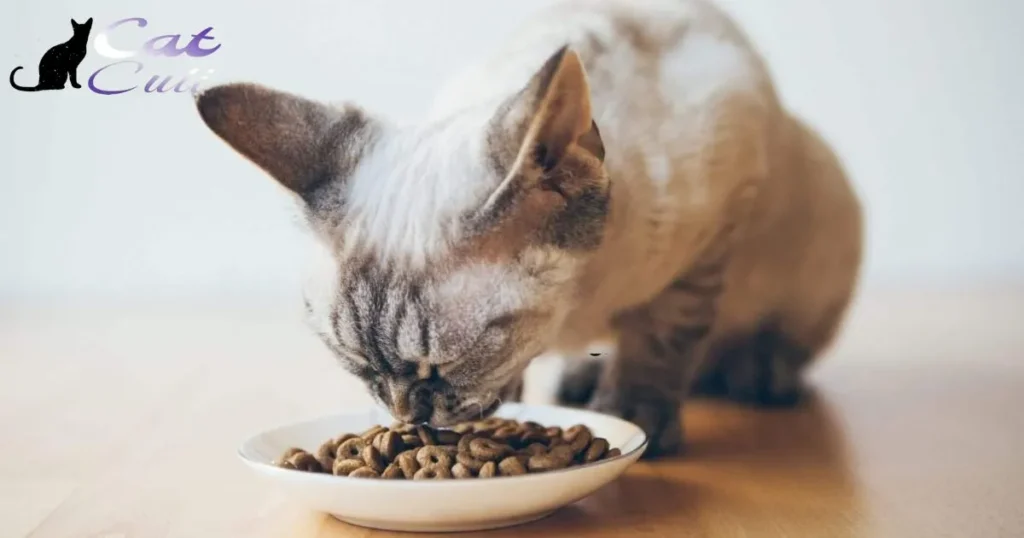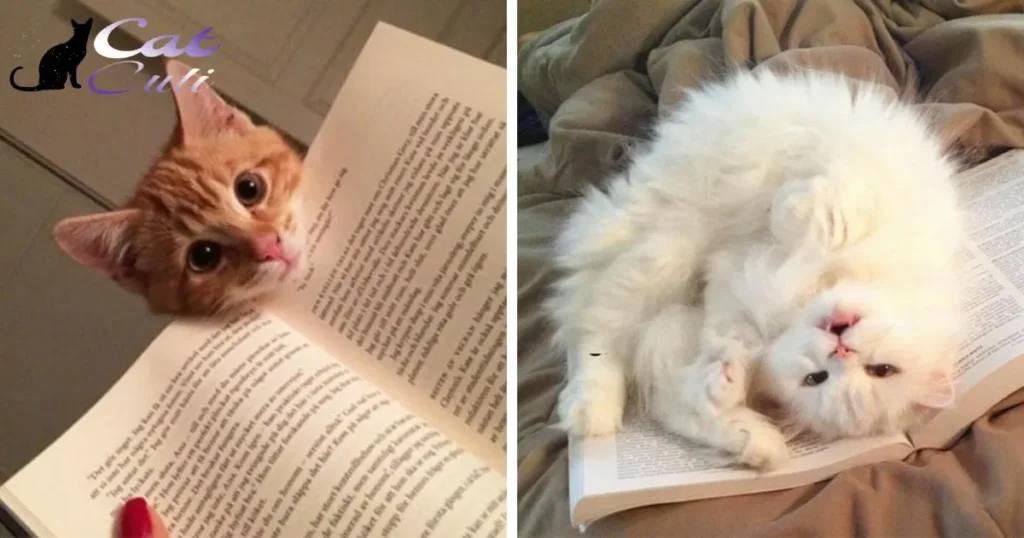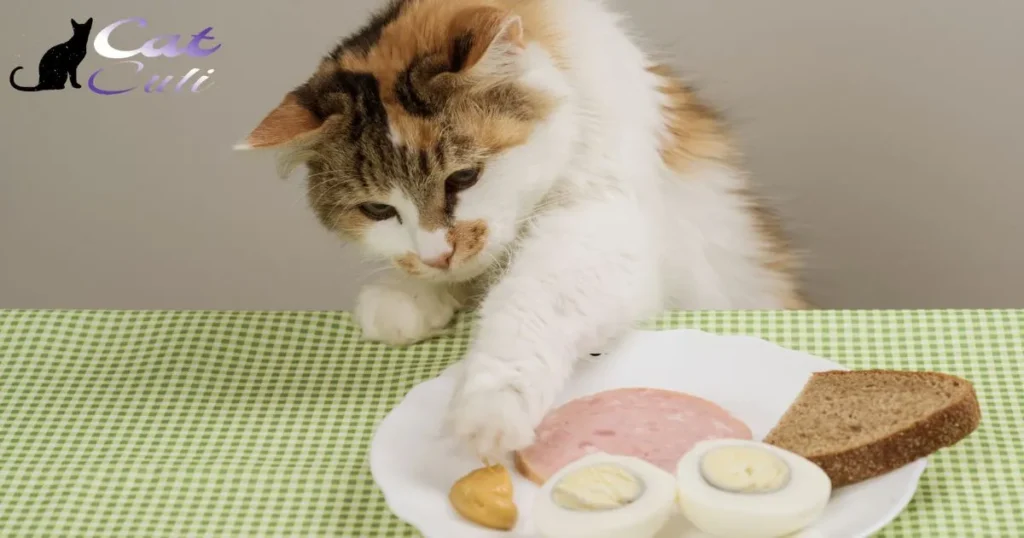Cats might obsess over food due to instincts from their wild ancestors. Some cats could feel insecure about not having enough food. Certain medical conditions might increase a cat’s hunger. Environmental factors or changes in routine could trigger food obsession in cats.
Do you ever wonder, Why is my cat food obsessed? It’s a common query among cat owners, and the answer might surprise you. From their ancestral instincts to potential health concerns, understanding this behaviour can shed light on your feline friend’s relentless pursuit of food.
Stay with us to unravel why your cat might be food obsessed From natural instincts to possible health issues, exploring these reasons can help manage your furry friend’s eating habits. Understanding their behaviour is the key to keeping your cat healthy and happy.
Former Stray Cat Food Obsession
A former stray cat’s food obsession might stem from their past experiences. Strays often had to fend for themselves, leading to a constant hunt for food. This behaviour can persist even after being adopted, as they’re wired to secure their next meal. Patience and a consistent feeding schedule can help ease their food fixation over time.
When a former stray cat becomes part of your family, their food obsession might puzzle you. Their history of scavenging for sustenance might drive this behaviour. Establishing a routine and providing a secure, reliable food source can gradually diminish their obsession as they adapt to their new home.
Is Your Cat Hungry Due To An Underlying Medical Problem?
Is your cat constantly hungry? This could indicate an underlying medical issue. Health problems like hyperthyroidism or diabetes might trigger increased appetite in cats. Consulting a vet helps identify and address these concerns promptly, ensuring your cat stays healthy and content.
When your cat seems insatiably hungry, it’s crucial to consider potential health issues. Conditions such as hyperthyroidism or diabetes can cause excessive hunger in cats. Seeking veterinary attention promptly ensures early detection and proper management of any underlying medical problems, ensuring your cat’s well-being and happiness.
Is Your Cat Hungry Because She Isn’t Getting The Right Nutrition?
Your cat’s hunger might be due to inadequate nutrition. Cats need a balanced diet with essential nutrients to stay satisfied. Lack of proper nutrition can lead to increased hunger and a constant search for food. Providing a well-balanced diet tailored to your cat’s needs is crucial for their overall health and satisfaction.
If your cat seems persistently hungry, it could be a sign of nutritional deficiencies. Ensuring your cat’s food meets their specific dietary requirements is essential. Addressing any potential nutritional gaps can help regulate your cat’s hunger levels and ensure they receive the nutrients necessary for their well-being.
Why Is My Cat Obsessed With Food?

Cats might obsess over food due to their natural instincts inherited from their wild ancestors. Their predatory nature drives them to seek out food constantly. Sometimes, certain medical conditions can lead to increased hunger in cats, causing them to appear food-obsessed.
Understanding these reasons can help in managing your cat’s diet and ensuring their overall health and well-being.A cat’s obsession with food could also stem from environmental factors or changes in their routine. Sudden alterations in their living environment or feeding schedule might trigger a heightened interest in food.
By observing their behaviour and addressing any potential stressors, you can help alleviate your cat’s food obsession and create a balanced and contented feline companion.
Food Obsession As A Symptom Of Disease
| Disease or Condition | Symptoms | Description |
| Hyperthyroidism | Increased appetite, weight loss, hyperactivity | A common condition in older cats, where the thyroid gland produces excess hormones, leading to hunger. |
| Diabetes mellitus | Excessive thirst, increased appetite, weight loss | Elevated blood sugar levels affecting cats’ insulin production, resulting in hunger despite eating. |
| Anxiety or Stress | Overeating, frequent food seeking behaviours | Environmental changes or stressors cause cats to seek comfort in food, displaying obsessive eating habits. |
| Gastrointestinal issues | Vomiting, diarrhoea, increased appetite | Digestive problems or illnesses affecting cats’ ability to absorb nutrients, leading to constant hunger. |
Eating Disorders In Cats
Understanding the Difference Between Indoor And Outdoor Cat Food is crucial for managing eating disorders in cats. Environmental shifts or health issues may alter their appetite. Additionally, exploring specialized diets for indoor versus outdoor cats can help address and prevent such irregular eating behaviors.
Observing your cat’s eating habits is crucial in identifying potential issues. Providing a consistent feeding schedule and a balanced diet helps manage and prevent eating disorders. If you notice any drastic changes in your cat’s eating behaviour, consulting a veterinarian promptly is essential for proper diagnosis and treatment.
How To Stop Food Obsession In Cats
Establish regular feeding times: Stick to a consistent schedule to regulate your cat’s eating habits.
Measure portions: Use recommended serving sizes to prevent overeating and obesity.
Offer interactive play: Engage your cat in playtime to distract from food fixation and promote exercise.
Use puzzle feeders: Make mealtime more engaging by using interactive feeders to slow down eating.
Provide mental stimulation: Introduce toys and activities to keep your cat’s mind occupied and reduce food-focused behaviour.
Consult a vet: If the obsession persists, seek advice from a veterinarian to rule out underlying health issues.
Make Sure Your Cat Is Getting The Proper Nutrients
Ensuring your cat gets the right nutrients is vital. Feed them a balanced diet with protein, fats, vitamins, and minerals. Check labels for AAFCO approval to guarantee they’re getting the nutrition they need. Keep an eye on their health and energy levels to confirm they’re thriving on their diet.
Regular vet check-ups help confirm your cat’s nutritional needs. Discuss their diet with the vet to ensure it meets their specific requirements. Adjust their food if necessary to keep them healthy and happy. Always prioritize their nutritional needs for a vibrant and active feline friend.
Be Sure Your Cat Is Getting Enough Attention

Make sure to give your cat plenty of attention daily. Interact through play, cuddles, and talking to keep them engaged. Cats thrive on attention, and it helps them feel loved and secure in their environment. Ensuring regular interaction contributes to your cat’s overall well-being and happiness.
Spending quality time with your cat is essential. Engage in activities they enjoy, like chasing toys or grooming sessions. Being present and attentive fosters a strong bond and reassures your cat, making them feel cherished and content in their home.
Do Not Leave Bowls Of Food Out
Leaving food bowls out can attract pests and insects, making a mess in your home. Cats might overeat if food is constantly available, leading to obesity and health issues. It’s best to feed your cat controlled portions at specific times to maintain a healthy diet and prevent food-related problems.
By removing food bowls after feeding times, you encourage your cat to develop a regular eating schedule. This practice also helps in monitoring their appetite and ensures they receive balanced nutrition. Preventing constant access to food can aid in maintaining your cat’s health and preventing unnecessary weight gain.
Cat Suddenly Obsessed With Food
Has your cat suddenly become fixated on food? This abrupt obsession might stem from various reasons. Changes in routine, stress, or medical issues could trigger this sudden focus on eating. Observing their behaviour and consulting a vet can help determine the cause and find solutions to ensure your cat’s well-being.
Understanding your cat’s sudden food fixation is crucial. It could signal an underlying problem that needs attention. Keep an eye on their behaviour, maintain a consistent feeding schedule, and seek professional advice to address any potential health concerns or environmental stressors causing this newfound obsession with food.
Cat Suddenly Obsessed With Human Food
Has your cat developed a sudden fascination with human food? This newfound interest could stem from curiosity or the desire to mimic their human companions. Cats might exhibit this behaviour due to the enticing smells and flavours emanating from our meals.
It’s essential to keep human food out of their reach to maintain their health and discourage this newfound obsession.When a cat becomes fixated on human food, it might signal a change in their routine or diet preferences. Cats may be drawn to the variety and richness of human food, leading to a persistent interest in what we eat.
Redirecting their attention to their own specially formulated cat food and providing engaging toys or treats designed for them can help curb this sudden fascination with human food.
My Cat Is Obsessed With Wet Food
Does your cat have an insatiable craving for wet food? Many felines prefer the moist texture and stronger aroma of wet food over dry kibble. Cats are natural hunters, and the smell and texture of wet food may remind them of their prey, triggering their obsession.
Introducing variety in their diet or consulting with a vet can help address their fixation on wet food and ensure they’re receiving a balanced diet.Your cat’s obsession with wet food might stem from its appeal as a more natural and flavorful option.
The strong scent and higher moisture content can be enticing to your cat’s senses, making it an irresistible choice. Monitoring their diet and providing a mix of both wet and dry food options can help manage their fixation while ensuring they get the nutrition they need.
Psychogenic Abnormal Feeding Behaviour
Psychogenic abnormal feeding behaviour refers to eating patterns in pets influenced by psychological factors rather than physical needs. Pets may exhibit compulsive eating, hoarding, or food-related aggression due to stress, anxiety, or past traumas.
This behaviour can result from environmental changes, boredom, or a lack of mental stimulation, requiring attention to the pet’s emotional well-being alongside dietary adjustments.
By addressing underlying emotional needs and ensuring a supportive environment, pet owners can help their animals overcome these behavioural challenges, promoting a healthier and happier relationship with food.
Cat Suddenly Obsessed With Food

Your cat’s sudden food obsession might signal a change in appetite or routine. Perhaps something’s triggering their hunger or creating anxiety around mealtime. It’s essential to observe any shifts in behaviour or health to ensure your cat’s well-being.
Consulting a vet could help identify any underlying issues causing this sudden change in eating habits.To address your cat’s newfound obsession, try sticking to a consistent feeding schedule and providing engaging activities to distract from food fixation.
Monitoring their diet and ensuring it meets nutritional needs can also help manage their obsession with food. Remember, understanding the cause is the first step in helping your cat regain a healthy relationship with meals.
Cat Suddenly Obsessed With Human Food
Your cat’s sudden interest in human food might stem from curiosity or a desire for variety. Cats are inquisitive creatures and might be drawn to the different smells and tastes of human meals.
Ensure you’re feeding your cat a balanced diet to deter their fascination with your food. Establish boundaries to prevent them from developing unhealthy eating habits or potential health issues.
Introducing new flavours or textures into your cat’s diet could trigger their sudden obsession with human food. Keep an eye on their behaviour and gently discourage them from begging at the table. Redirect their attention to their own meals and provide stimulating toys or activities to keep them occupied and satisfied.
Cat Food Trauma
Cat food trauma can deeply impact a feline’s eating habits. A sudden change in diet or a distressing experience while eating might trigger aversion. Cats are sensitive to food changes, and such traumas can lead to refusal or anxiety during meal times. Understanding and slowly reintroducing food can help alleviate their distress and rebuild their eating routine.
Introducing new food abruptly or forcing a change in diet can cause cat food trauma. Cats prefer consistency and sudden alterations may disrupt their eating behaviour. A traumatic experience related to food can create a lasting aversion, making it essential to introduce changes gradually to avoid triggering their distress.
Former Stray Cat Food Obsession
A former stray cat’s food obsession often stems from their survival instincts. Having once struggled to find enough food, they might overeat out of fear of scarcity. This behaviour can persist even after they’ve found a loving home, as the instinct to hoard food remains strong.
To address this, provide consistent mealtimes and portion control to reassure the cat that food will always be available. Creating a safe and secure feeding environment can help ease their obsession with food, allowing them to adjust to their new life comfortably.
My Cat Is Obsessed With Wet Food
Does your cat go crazy for wet food? Many cats adore the smell, texture, and taste of wet food due to its higher moisture content. They might prefer it over dry kibble because it resembles their natural prey, satisfying their instinctual cravings. Understanding your cat’s preference for wet food can help you provide a diet that keeps them content and healthy.
Some cats obsess over wet food due to its enticing aroma and rich flavours. They’re drawn to the texture and moisture, similar to the food they’d find in the wild. This obsession is often a result of their natural instincts, making wet food a top choice for many feline friends.
Senior Cat Obsessed With Food
An older cat fixated on food might signal changing nutritional needs or a medical issue. Cats aging might experience altered appetites, seeking more food as they grow older. It’s crucial to monitor their diet closely and consult a vet to ensure their health remains in top shape.
Senior cats fixating on food could indicate a need for dietary adjustments or potential health concerns. With age, cats might develop increased hunger or changes in taste, requiring tailored nutritional plans to support their wellbeing. Regular vet check-ups and a balanced diet are vital for a happy, healthy senior feline.
Psychogenic Abnormal Feeding Behaviour
Psychogenic abnormal feeding behaviour in pets arises from psychological factors rather than physical issues. Stress, anxiety, or past trauma can trigger this behaviour. Pets may exhibit excessive eating, food guarding, or even refusing to eat due to psychological distress.
Understanding these emotional triggers helps address and manage these feeding behaviours effectively, ensuring your pet’s well-being and happiness.To tackle psychogenic abnormal feeding behaviour, it’s vital to create a stress-free environment for your pet.
Providing a consistent routine, ample playtime, and positive reinforcement can alleviate their anxiety. Consulting with a veterinarian or animal behaviourist can offer tailored strategies to address your pet’s specific psychological needs, aiding in resolving their abnormal feeding habits.
FAQ’s
How do I stop my cat from being food obsessed?
Ensure regular feeding times, use food puzzles for mental stimulation, and consult a vet for diet adjustments or underlying issues.
Why does my cat keep wanting food?
It might be instinctual, boredom, or an underlying health concern. Evaluate diet, stress levels, and seek vet advice.
Why is my cat so obsessed with human food?
Human food smells appealing and might resemble their diet. Train by offering cat-friendly alternatives.
Why is my cat constantly meowing for food?
Meowing could signal hunger or seeking attention. Stick to a feeding schedule and avoid reinforcing meowing with food.
Conclusion
In understanding Why Is My Cat Food Obsessed? It’s clear that various factors contribute to this behaviour. Cats’ instincts, past experiences, health issues, and environmental cues all play roles in their obsession with food. Recognizing these triggers enables better management and ensures your cat’s well-being.
Ultimately, addressing this obsession involves a holistic approach. Establishing consistent feeding routines, providing mental stimulation, and consulting with a vet are crucial. Fostering a stress-free environment and offering appropriate, balanced meals can help curb food obsession, ensuring a happier, healthier feline companion.








